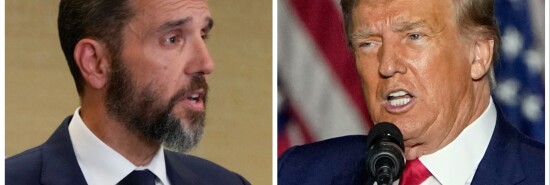
The holiday rush to get Trump: Is it equal justice?
Byron York
THE HOLIDAY RUSH TO GET TRUMP: IS IT EQUAL JUSTICE? The federal court system does not move at lightning speed at any time of the year, and certainly not in late December. But the U.S. Court of Appeals for the District of Columbia Circuit is working overtime through Christmas and New Year, pushing to decide some of the complex and difficult issues involved in special counsel Jack Smith’s criminal case against former President Donald Trump. The judges act as if they are racing the clock — and they are. Why? Because if they don’t act fast, Smith will have no chance to realize his goal of trying, convicting, and jailing Trump, the leading Republican presidential candidate, before the 2024 election.
The Trump prosecution, focusing on the 2020 election and the Jan. 6 riot, raises a lot of legal issues. But the hottest one of the moment is Trump’s contention that he is immune from criminal prosecution for acts he took as president. It is something that has never been litigated before, and given its consequence, it’s something that is guaranteed to be decided by the Supreme Court.
But not without a process. First, Trump made his case for immunity to the judge in his trial, federal District Court Judge Tanya Chutkan, who ruled against Trump. Next, in a normal process, Trump would appeal to the U.S. Court of Appeals for the District of Columbia Circuit, where the case would be decided by a three-judge panel. Then, if Trump lost, he would ask the entire court to consider it. And then, if Trump lost again, he would appeal to the Supreme Court.
Subscribe today to the Washington Examiner magazine that will keep you up to date with what’s going on in Washington. SUBSCRIBE NOW: Just $1.00 an issue!
You all know that Smith, racing to meet his goal, asked the Supreme Court to step in and take the case right away, skipping the steps at the D.C. Circuit Court of Appeals. But at the same time he filed with the Supreme Court, Smith also filed with the court of appeals for super-quick consideration, just in case the Supreme Court turned him down. And indeed, when the Supreme Court declined to give Smith what he wanted, the case fell back to the court of appeals. Now, the judges are working feverishly to give Smith the schedule he wants.
The court, a three-judge panel consisting of one judge appointed by President George H.W. Bush and two by President Joe Biden, ordered Trump to submit his case for immunity by Dec. 23, last Saturday. Then the court ordered Smith to respond by Dec. 30, next Saturday. Then the court ordered Trump to reply to that by Jan. 2. The court set oral arguments for one week later, on Jan. 9. After that, the judges will presumably issue their decision on an equally hurried basis.
Then, it is unclear what the Supreme Court will do. All anybody knows is that it will be hard for Chutkan to start the trial on March 4, the day before Super Tuesday, as she had originally ordered.
It’s all being done in an incredible rush. “The average federal conspiracy and fraud trial takes about a year and a half to two years between indictment and trial,” former federal prosecutor and CNN analyst Elie Honig said recently. “In this case, we have dozens, hundreds of Jan. 6 rioters caught on video, straightforward cases that were given about a year and a half to two years between indictment and trial. Jack Smith originally requested a trial date for Donald Trump, a far more complex case, five months out. He wanted a January trial. It was set for two months later [March 4]. So Donald Trump was being given far less time to prepare than other defendants.”
The D.C. Circuit Court’s actions suggest it is on board for Jack Smith’s rush job. “The only reason you ask the Supreme Court to [decide the immunity question] on an expedited basis is if you’re racing against the clock,” Honig said. “And Jack Smith clearly is doing that here.” Why? Smith’s motive, Honig continued, “really is, I want Donald Trump convicted before the election. I have no problem with the first part of that — it’s his job to want to try to convict Donald Trump. But the second part of that, ‘before the election,’ that’s where it crosses the line to the political.”
It’s important to note that Smith has never — never — admitted that he is rushing to try Trump before the election, even though that seems obviously true. If Smith did admit that, he would run afoul of Justice Department guidelines, which state: “Federal prosecutors and agents may never select the timing of any action, including investigative steps, criminal charges, or statements, for the purpose of affecting any election, or for the purpose of giving an advantage or disadvantage to any candidate or political party.”
Could anyone say, with a straight face, that Smith’s actions, specifically his moves to hurry the case, are absolutely not, no way, no how, “for the purpose of affecting any election”? That seems precisely their purpose.
In her opinion rejecting Trump’s immunity claim, Chutkan wrote, “A former president’s exposure to federal criminal liability is essential to fulfilling our constitutional promise of equal justice under the law.” But the rush to try Trump, from the prosecutor to the judge to the appeals court, does not seem to be an example of “equal justice” at work. Instead, the former president is receiving very special treatment from the system, and it is all about the 2024 presidential election.
For a deeper dive into many of the topics covered in the Daily Memo, please listen to my podcast, The Byron York Show — available on Radio America and the Ricochet Audio Network and everywhere else podcasts can be found.
